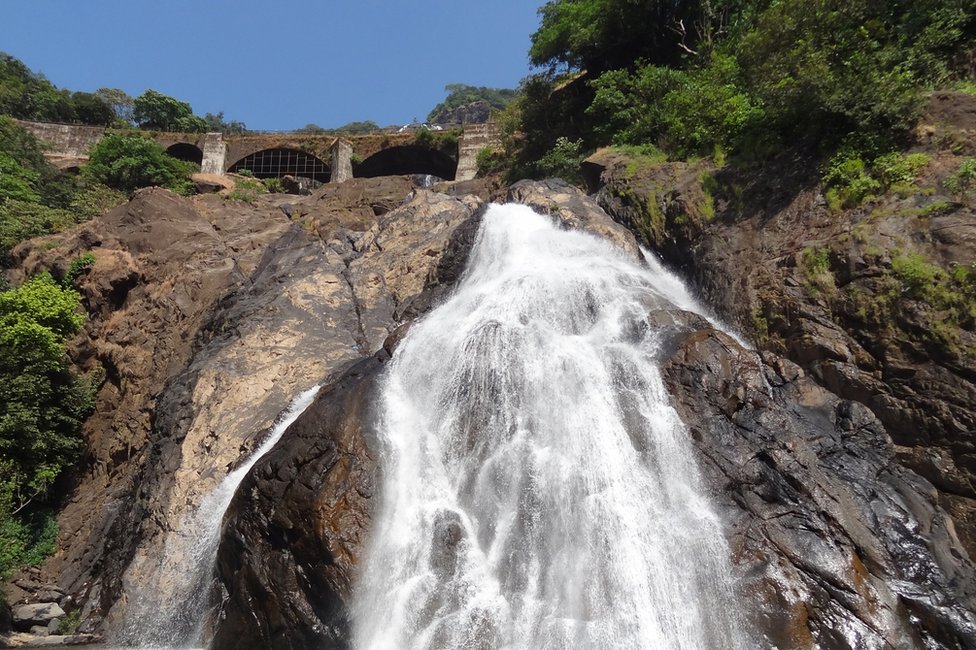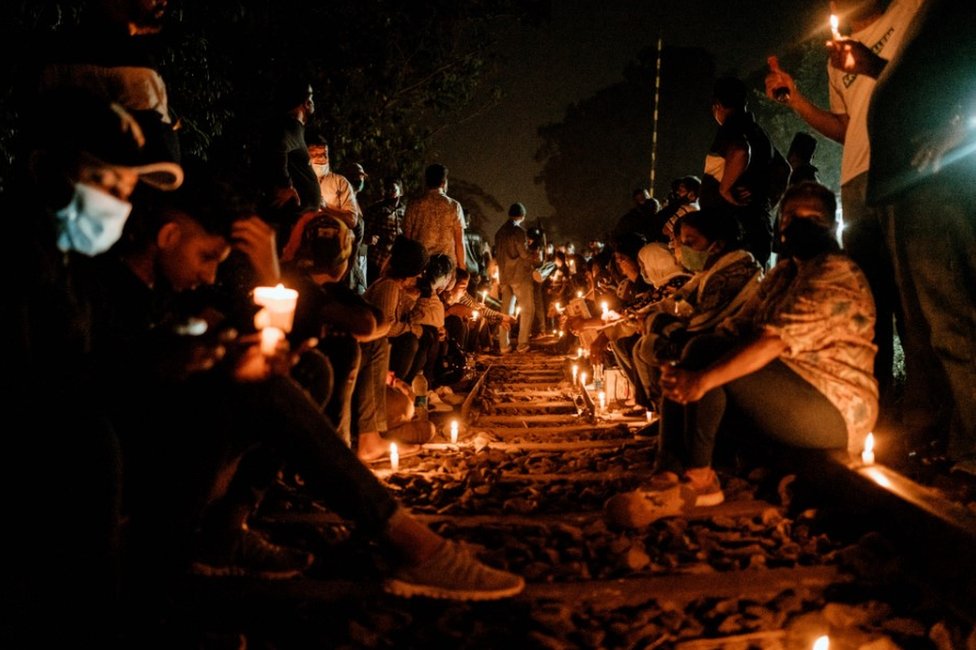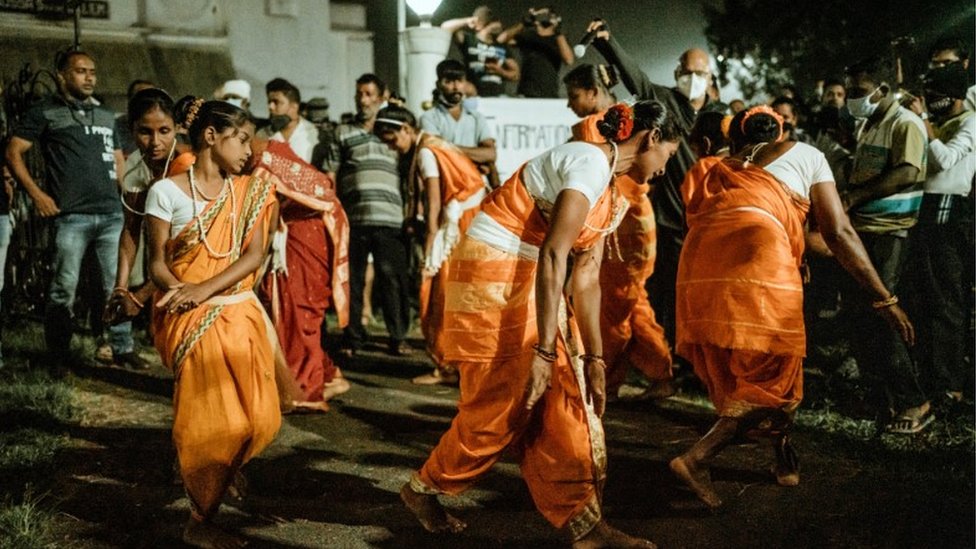
The battle to save a biodiversity hotspot in India
Goa, a lush, popular tourist spot on India's western coast, has seen weeks of protests against three infrastructure projects. Locals fear the works will damage the state's biodiversity and turn it into a coal hub, reports freelance journalist Dielle D'Souza.
During an evening stroll on Goa's Querim beach, Claude Alvares holds up a lump of coal he has found in the sand. Mr Alvares, a local activist, says the piece of black rock travelled all the way to Goa's northern-most tip from Mormugao Port Trust (MPT), about 70 kms (43 miles) away in the middle of the state.
"This coal is very light," he says. "It gets into the water and the waves distribute it over Goa's beaches. Chances are, if you are walking on a beach anywhere in Goa, you may find this under your feet."
Goa's only port, MPT, is embroiled in protests. It currently handles around nine million tons of imported coal bound via road and rail mainly for steel plants in neighbouring states.
Reports suggest that MPT aims to import 51.6 million tons by 2030 to transport it through Goa to other states for companies such as the Adani Group, JSW Group and Vedanta.
- 'Our village is on the verge of extinction'
- The environment law that mobilised two million Indians
- How the virus cleared the world’s most polluted skies
So when the government announced three new projects - expansion of a highway, double-tracking of an existing railway line and setting up of a transmission power line - environmentalists said it was to make coal transportation easier.
Goa's government has denied this, saying the projects have nothing to do with coal. It says the new power line will provide the state much-needed electricity, the highway will meet the demands of growing traffic and the extra railway line will allow more goods and passenger trains to run.
But environmentalists are concerned, especially since all three projects cut through a protected wildlife reserve in south Goa, threatening forests that they say are older than the Himalayas.
The state's tourism industry is also anxious. Goa's lush forests and stunning beaches, which span the range from crowded to untouched, draw millions of tourists, both Indian and foreign, every year. They fear that projects such as these could hurt an industry that relies on adventure and wildlife, from trekking to bird-watching to surfing.
The biodiversity at stake
The protected area in question spans 240sq km (93 sq miles) of India's Western Ghats, recognised by Unesco as one of the world's eight 'hottest hotspots' of biological diversity. It is the site of a 12th Century Hindu temple, verdant tropical forests and waterfalls, including Dudhsagar that is a big tourist draw.
The reserve is home to 128 endemic plants, birds, butterflies, reptiles and a variety of wild mammals including leopards, Bengal tigers and pangolins.
One species of dragonfly has been recorded in only one location in Goa close to the proposed railway tracks, while the transmission line site is one of only two locations in India where a reclusive ant species has been found.
Herpetologist and conservationist Nirmal Kulkarni says it was in these forests that he discovered his love for snakes on his first visit during a school picnic. The area was not identified as a reserve then, but he recalled "a small gurgling stream flowing slowly into a deep emerald-green forest".
 IMAGE COPYRIGHTGETTY IMAGES
IMAGE COPYRIGHTGETTY IMAGES
image captionThe reserve is home to lush forests and waterfalls
"I've come to Mollem National Park many times after that. These tropical forests have an amazing diversity of reptiles and amphibians, some of which are not found anywhere else in the world, and it is this diversity that we need to protect," Mr Kulkarni said.
He is among hundreds of concerned citizens, scientists, activists, students and others who have signed letters to representatives in the state and central government, including India's Environment Minister Prakash Javadekar, asking for the projects to be scrapped over threats to the park and a nearby sanctuary.
Saving Mollem
Local resistance - involving several groups and independent protesters - began after Mr Javadekar cleared several infrastructure projects over video conference, barely two weeks after India went into a coronavirus lockdown in March.
Campaigners question the manner in which the projects were cleared and want a review of it. But on a recent visit to Goa, Mr Javadekar did not answer questions about this. And when asked about concerns raised by locals, he only said he "will definitely study" any petitions they send him.
 IMAGE COPYRIGHTCHEVON RODRIGUES
IMAGE COPYRIGHTCHEVON RODRIGUES
image captionThousands of campaigners camped out on a railway line to protest its expansion
Soon after, thousands of protesters camped overnight at the railway track in Chandor, calling against its expansion. Six of them were charged with rioting and unlawful assembly, although others present say there was no sign of unruly behaviour and the charges are uncalled for.
"We had to risk our lives [to gather during the pandemic] so the government could pay attention to us," says Sherry Fernandes, who attended the protest. "It was a success in terms of creating more awareness about the issue, but it was not a success in terms of our demands and will not be until the government listens to us."
The protesters want the government to scrap the three new projects and stop all transportation and handling of coal.
Is coal driving the expansion?
"We also want a coal-free Goa and a pollution-free environment," Goa Chief Minister Pramod Sawant recently said. "We are searching for alternatives for coal. We will reduce the quantity of coal being transported over the years and eventually stop it."
 IMAGE COPYRIGHTCHEVON RODRIGUES
IMAGE COPYRIGHTCHEVON RODRIGUES
image captionProtesters have been performing traditional dances to raise awareness about local communities
But campaigners are not convinced. They say the government's claims that the new power line will meet Goa's shortage doesn't add up because the amount of power purchased from other states over the last nine years has grown only marginally. And in 2018-19, not all of it was consumed - by domestic or industrial users.
They also say the infrastructure plans cutting through the reserve are part of the nation-wide federal government initiative to build new ports and improve connectivity to and from the existing ones.
"All the documents point to Goa becoming a coal hub," says activist Abhijit Prabhudesai. "We have shared these documents with the government more than five months ago, but they are still unable to produce a single document to refute our claims."

